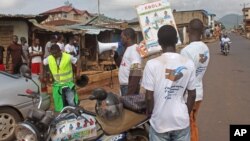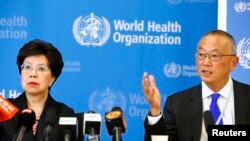The Ebola outbreak has killed nearly 900 people in Guinea, Sierra Leone, Liberia and now Nigeria. This is the first time West Africa has seen Ebola, and it is turning out to be the worst outbreak of the disease ever, in part because people either don't what to or are refusing to comply with public health recommendations. Experts say education may be more effective than enforcement.
More of education is what public health experts say may turn the tide against Ebola.
Health worker Bunch Wieh met with a community in Margibi county, Liberia. Two people have died of the disease here.
"Ebola has no cure. Ebola has no cure. But what you can do is to prevent yourself from the deadly disease. Please stop eating bush meat. Please stop touching your friend. Please stop shaking hands. These are ways people can catch the Ebola disease," said Wieh.
People have plenty of questions.
A man asked, "if there's no cure, then what can doctors do for people at the hospital? What's the point of going there?"
It's a common area of confusion. Health workers continue to remind people that some patients are fighting off the disease with medical care.
They emphasize that for containment to work, sick people must be isolated so they don't infect others - and that every person who had contact with an Ebola patient's bodily fluids must be monitored, in case any of those people get sick.
That is how you stop the chain of infection.
But that isn't happening everywhere in Guinea, Liberia and Sierra Leone, the countries hit hardest by the Ebola outbreak.
The virus spread quickly across those countries' borders starting earlier this year. People did not know what the disease was. Some infected people hid from authorities or ran away. Families continued to handle and bury the bodies of Ebola victims. And so, the disease continued to spread.
Stephane Doyon, the West African chief for Doctors without Borders, said that communities continued to resist medical assistance and more education is needed.
"In Liberia, Sierra Leone and certain parts of Guinea where we are having trouble accessing certain villages. We know there are probably cases there, that people are dying and that the disease is spreading. But we can do nothing. We either don't know about the cases, or the population won't let us in because they don't understand we are there to help," said Doyon.
Liberia and Sierra Leone have deployed security forces to enforce containment measures and protect health workers amid growing hostility. It's illegal to knowingly harbor someone who has Ebola. Liberia is considering quarantining affected zones. Sierra Leone already has.
But can the outbreak be stopped through such dramatic measures?
Dr. Unni Krishnan, the head of disaster response and prevention for Plan International.
"These measures will have limitations so this is where informing people, educating people, and encouraging them to come forward is key. That's what will finally be yielding results," said Dr. Krishnan.
He said more international funds were needed for nearly every aspect of this response effort, especially education.
Meanwhile, health volunteers continue going door-to-door. They are handing out leaflets and tying up signs with hand drawn pictures of the various symptoms and putting catchy songs on the radio, scrambling to get to people before Ebola does.





